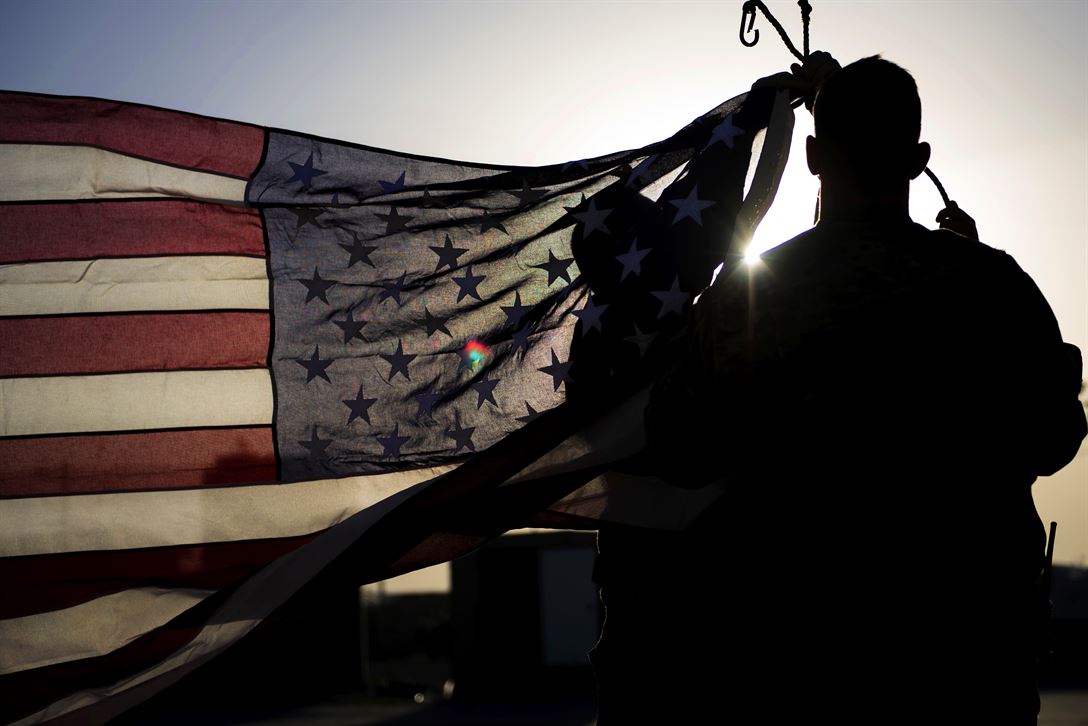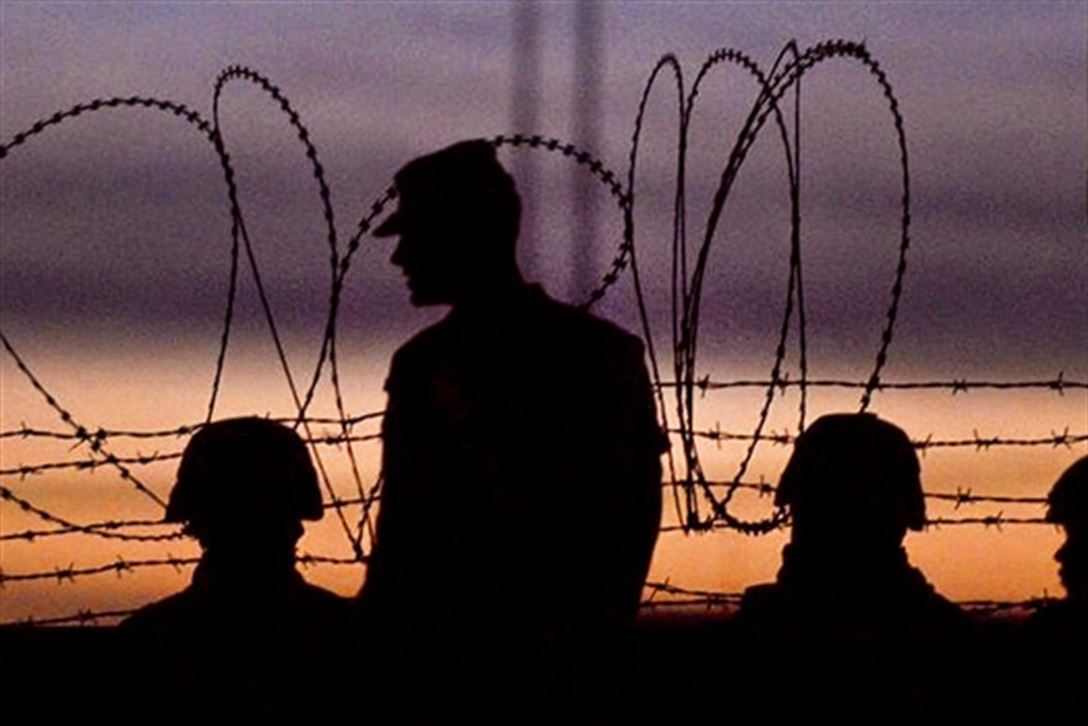
Airmen raise a new flag during a flag retirement ceremony at Bagram Airfield, Afghanistan, May 28, 2016. Air Force photo by Senior Airman Justyn M. Freeman
It was recently announced that the Department of Veterans Affairs is going to start providing emergency mental health support for veterans regardless of discharge. This is a huge step in the right direction for getting all veterans the support they need. This service is going to be provided will be time-limited, and require the veteran present in an emergent condition to their local VA Clinic, but something is better than nothing.
It’s national news, and any amount of water is welcome to a thirsty man in the desert. What this does, however, is bring the topic out into the open to start a national conversation: what do we, as a nation, owe to those who served in the military? What responsibility does an individual citizen have to someone who volunteered to join the military? Kristofer Goldsmith, founder of High Ground Veterans Advocacy, has become an outspoken advocate for this subject. Take a few minutes to see his work, and more importantly, important information about this challenge:
This can be a complicated discussion with many different facets. Here are some thoughts from the perspective of a someone who is both a combat veteran and a mental health professional:
Many veterans reject the thought of someone “owing” them something
The fact that this is even a discussion, that the nation has a responsibility to “take care” of those who served, is often rejected by many service members. The military does not cause service members to become solo warriors, depending on no one but themselves, but there is certainly a sense of “in” or “out.” Members of the team, who’ve been there, are able to be included in the support network; they have earned the right, because the service member has a mutual obligation to support them. My shield covers my brother, so to speak, just as my brother’s shield covers me. This doesn’t mean that they reject everyone else, but the fact is that there is an attitude of service that rejects the concept of being served. This is something that the veteran has to understand and come to terms with.
Many veterans reject the thought of being “broken”
“Broken” conjures up thoughts of being damaged, useless, worthless. “Broken” is what happened to that guy or gal in your squad who just couldn’t hack it anymore, and went to sick call or dropped out of the run. No one wanted to be that person in the squad, the one who just couldn’t be counted on…so the thought of “you broke it, you bought it” is likely to be rejected by the veteran. The truth is, however, that military service members have engaged in and endured some of the most mind and soul altering experiences, and repeated exposure to these experiences has an impact on both mind and soul. Those outstanding athletes at the Warrior Games? In spite of physical (and psychological) injuries, they thrive and persevere, and while they also would reject the concept of being “broken,” they have sustained damage to their brain and body. Like it or not, reject it or not, it’s the truth.
Some in the community will reject responsibility
I understand that there are many in society who will reject the thought that they have a personal responsibility to care for a veteran who has been impacted by their military service. “Well, they signed up for it, they knew what they were getting into,” the argument goes. Or, “they have doctors and stuff that take care of that, right? What do I have to do with it?” Outside of this being a self-focused point of view, many who enjoy liberty and freedom to express those thoughts might not consider the price that had been paid for them to be able to do so. Sure, perhaps around the 4th of July, Memorial Day, and Veterans day, does the country start to say, “thanks” but it’s a word that is often not backed by substance. There are those who may disagree with the actions that the nation took in overseas conflicts, but as Paul Dillon said to Byron Chen on the SuccessVets podcast, “we have finally been able to separate the war from the warrior.” Veterans served without any expectation beyond what they were promised for their service. Just because the expectation is not there, however, does not mean the obligation doesn’t exist.
It’s a complicated problem with no easy solution
The challenge in providing mental health support to all veterans, regardless of era, type, and manner of service, is complicated by many factors. There is a severe shortage of clinical mental health professionals in our country. Of those who are licensed and certified, a significant number of them are not familiar with the cultural aspects of military service. Mental health practitioners, although having spent significant time and resources to be able to become licensed professionals, are often expected to provide services at little or no cost. Many insurances, including Medicare and Medicaid, do not support mental health services at the same level they do for physical health. All of this combined creates the challenge that those who are in the greatest need of support, such as those veterans with bad paper, are also those with the least amount of resources. Someone has to pay the bill for veteran mental health services, and it should not be the veteran themselves.
The decision between good paper and bad paper is often arbitrary
I’ve been in the military. I know what happens when a service member gets discharged for patterns of misconduct. The choice of whether or not a service member gets a discharge labeled “general under honorable conditions” or “general under other than honorable conditions” is quite often an arbitrary one that happens on their way out of the military. Someone in the service member’s chain of command, acting on their own sense of “right” or “wrong” has the ability to recommend to the service member’s commander of the type of discharge to be received. In Army Regulation 635-200, Active Duty Enlisted Separations, for example, the chapter covering misconduct has the following language:
14–3. Characterization of service or description of separation
a. A discharge under other than honorable conditions is normally appropriate for a Soldier discharged under this chapter. However, the separation authority may direct a general discharge if such is merited by the Soldier’s overall record.
Although many would expect that such a policy would be reasonably applied, it doesn’t always happen. This one example indicates that a separation for misconduct typically always results in a discharge under other than honorable conditions, and requires that everyone making a recommendation to the commander agree that the overall service of the soldier merits a change in that decision. While the military has taken steps to safeguard this decision, such as by instituting administrative review boards for those service members who have served for longer than six years, this does not apply retroactively to the thousands of service members previously separated under these conditions.
Community providers have been supporting “bad paper” vets for years
A final thought is that, as is often the case, organizations outside the government have stepped in to address an issue that impacts their communities. The United Way, for example, is a long-standing charitable organization that builds a coalition of charitable organizations in order to make measurable impacts in communities. They often work alongside and on the behalf of local governments to address challenges in housing, health, education, and income. Similarly, there are clinical mental health organizations in the community that have been providing support for veterans with bad paper for many years. National organizations, such as Give An Hour, The Soldiers Project, The Headstrong Project, and the Cohen Veterans Network are all currently providing clinical mental health counseling support to veterans regardless of discharge status. For more information on each of them, please follow the links provided. Similarly, many local organizations are providing this support, such as our agency in Colorado Springs and the Sturm Center for Military Psychology in Denver. Our agency alone has been providing support for veterans with bad paper since 2012.
As with many other aspects of veteran mental health, this is a complicated issue. There is no single, easy, or comprehensive answer. Did some veterans discharged other than honorably deserve that designation? Absolutely, but they are by no means the majority. The same can be said about some veterans who received honorable discharges but conducted themselves in a dishonorable way. The purpose of this post is to consider what we, as a nation, owe those who sacrificed much on behalf of our safety and security. If this is important to you, join the conversation. Do the research. Listen to the stories of those veterans who sacrificed, were wounded physically and psychologically, and consider the price that they paid. Then consider who is going to pay that price…them, or the nation that called upon them to do so.

The Head Space and Timing Blog is supported by the Colorado Veterans Health and Wellness Agency, a 501(c)3 Nonprofit in Colorado Springs, Colorado. The goal of the CVHWA is to provide military culturally competent mental health counseling to veterans and their spouses, regardless of characterization of discharge, time of service, or era of service. Our vision is to assist veterans to identify and remove barriers to their mental, physical, emotional, and behavioral wellness. For questions or inquiries, contact us!


